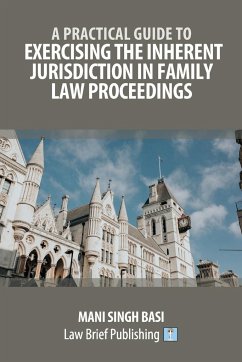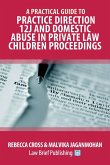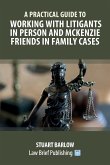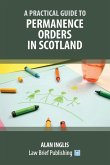The inherent jurisdiction is a powerful tool to ensure that children subject to proceedings are properly protected, which can be achieved in many different ways. The inherent jurisdiction is often regarded as a complex area of family law due to the complexity of cases that enter its arena, ranging from child abduction disputes and determination of cross-border issues, wide-ranging injunctive powers, orders relating to medical treatment and complex disputes relating to public and private law proceedings. This book will provide practitioners working in family law with a toolkit as to how to embark upon proceedings relating to the inherent jurisdiction. There will be a focus on the types of orders that can be made under the inherent jurisdiction and consideration as to the purpose. The book will consider the inherent jurisdiction across a range of different practice areas within family law such as child abduction, private and public law disputes and other injunctive / protective orders that are designed to safeguard children. In particular, this book will consider in the context of the inherent jurisdiction: tracing/locating children and respondents, deprivation of liberty, forced marriage protection orders, female genital mutilation orders, inward and outward abduction, vaccinations, tipstaff orders, and disputes relating to medical treatment. This book will consider the limits to the inherent jurisdiction as well as how to best present cases, whether you are acting for an applicant, respondent, the subject children or any other interested party within proceedings. ABOUT THE AUTHOR Mani Singh Basi is a barrister at 4PB. He is a practitioner who has a specialist interest in cases with an international element. As such, he regularly appears in the High Court in cases relating to the inherent jurisdiction of the High Court such as child abduction. He was the winner of the Family Law Commentator of the Year Award at the LexisNexis 2022 Family Law Awards and previously published a book titled 'A practical guide to stranded spouses in family law'. In 2023, he was shortlisted for the International Lawyer of the Year award. CONTENTS Chapter One - An Introduction to the Inherent Jurisdiction Chapter Two - Procedure to Commence Proceedings Chapter Three - Orders Made Under the Inherent Jurisdiction Chapter Four - The Inherent Jurisdiction and Child Abduction Chapter Five - The Inherent Jurisdiction and Public Law Proceedings Chapter Six - The Inherent Jurisdiction and Injunctive Orders Chapter Seven - The Inherent Jurisdiction and Private Law Matters Chapter Eight - The Inherent Jurisdiction and Medical Treatment Chapter Nine - Concluding Thoughts








